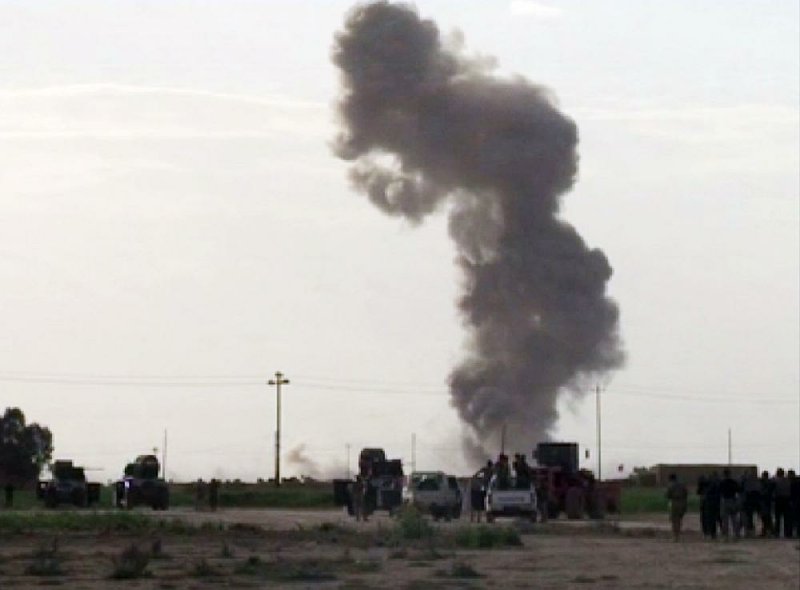BAGHDAD -- Iraqi troops and Shiite militias battled the Islamic State on Tuesday on the outskirts of militant-held Tikrit, unable to advance farther on Saddam Hussein's hometown as roadside mines and suicide attacks slowed their progress.
Soldiers found about 100 mines and bombs scattered along a 5-mile stretch of road on the way to the strategic city on the Tigris River, Salahuddin Deputy Gov. Ammar Hikmat said.
The bombs are "the main obstacle in the way of the attacking forces, which have to wait for bomb experts or to go around the area," Hikmat said. "And this costs time."
Extremists from the Islamic State, which holds both a third of Iraq and neighboring Syria in its self-declared caliphate, have littered major roadways and routes with mines. Such mines allow the extremists to slow ground advances.
Suicide bombings also aid the militants in weakening Iraqi forces. A militant website affiliated with the Islamic State said an American jihadist carried out a suicide attack with a truck bomb on the outskirts of the nearby city of Samarra, targeting Iraqi forces and Shiite militiamen. The posting identified him as Abu Dawoud al-Amriki.
A suicide bomber drove a military vehicle Tuesday afternoon into a checkpoint manned by government forces and Shiite fighters south of Tikrit, killing four troops and wounding 12, a police officer and a medical official said.
Tuesday was the second day of the Iraqi advance on Tikrit, with soldiers supported by Iranian-backed Shiite militias and advisers, along with some Sunni tribal fighters who reject the Islamic State. Hikmat estimated the Iraqi force besieging Tikrit at 25,000. Iran's semiofficial Fars news agency has reported that Iranian Gen. Ghasem Soleimani, the commander of the country's elite Revolutionary Guard's Quds Force, was taking part in the offensive.
Government forces made little headway Tuesday, two local officials said. They said fierce clashes took place outside the town of al-Dour, south of Tikrit, while government troops shelled militant bases inside the city. The officials spoke on condition of anonymity because they were not authorized to brief journalists.
Brig. Gen. Saad Maan Ibrahim, an Interior Ministry spokesman, said explosives experts had disabled "many bombs and car bombs."
Hikmat said "dozens" of Islamic State extremists were killed or wounded but that the attacking forces also have suffered casualties.
On Monday, Iraqi and U.S. officials said the U.S.-led coalition was not involved in the Tikrit operation and had not been asked to carry out airstrikes.
Retaking Tikrit, the provincial capital of Salahuddin province about 80 miles north of Baghdad, would help Iraqi forces secure a major supply link for any future operation to capture Mosul, the country's second-largest city.
U.S. military officials have said a coordinated mission to retake Mosul will likely begin in April or May and involve up to 25,000 Iraqi troops. But the Americans have cautioned that if the Iraqis aren't ready, the offensive could be delayed.
On Tuesday, Defense Secretary Ashton Carter said a military officer's media briefing about plans for the Mosul offensive, including its expected timing, amounted to a mistaken disclosure of "military secrets."
The officer's presentation for reporters at the Pentagon on Feb. 19 was authorized by U.S. Central Command.
"That clearly was neither accurate information nor, had it been accurate, would have been information that should be blurted out to the press," Carter told the Senate Armed Services Committee. "So it's wrong on both scores."
Army Gen. Martin Dempsey, chairman of the Joint Chiefs of Staff, said he had discussed the Mosul briefing with Gen. Lloyd Austin, head of Central Command.
"He's conducting an internal inquiry," Dempsey said.
Testifying before the House Armed Services Committee about the state of the conflict against the Islamic State, Austin said Tuesday that coalition airstrikes have killed more than 8,500 Islamic State fighters since the campaign began in August.
Austin said the Islamic State is no longer capable of seizing and holding new territory.
"[The Islamic State] has assumed a defensive crouch in Iraq," Austin said.
Austin said the U.S.-led bombing campaign has destroyed "hundreds" of the group's vehicles, tanks and heavy weapons. The campaign also has degraded the group's ability to generate revenue by striking oil refineries and crude-oil collection sites, particularly in Syria.
Austin made the remarks at a hearing on President Barack Obama's request for new legal authority to execute the military campaign.
Information for this article was contributed by Maamoun Youssef, Jon Gambrell and Robert Burns of The Associated Press.
A Section on 03/04/2015


